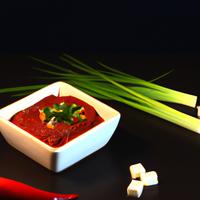
1 serving (15 grams) contains 25 calories, 0.5 grams of protein, 0.2 grams of fat, and 5.0 grams of carbohydrates.

Log this food in SnapCalorie

Nutrition Information
Calories |
394.3 | ||
|---|---|---|---|
% Daily Value* |
|||
| Total Fat | 3.2 g | 4% | |
| Saturated Fat | 0 g | 0% | |
| Polyunsaturated Fat | 0 g | ||
| Cholesterol | 0 mg | 0% | |
| Sodium | 4731.9 mg | 205% | |
| Total Carbohydrates | 78.9 g | 28% | |
| Dietary Fiber | 1.6 g | 5% | |
| Sugars | 63.1 g | ||
| protein | 7.9 g | 15% | |
| Vitamin D | 0 mcg | 0% | |
| Calcium | 78.9 mg | 6% | |
| Iron | 1.6 mg | 8% | |
| Potassium | 315.5 mg | 6% | |
* Percent Daily Values are based on a 2,000 calorie diet. Your daily values may be higher or lower depending on your calorie needs.
Food Attributes
Source of Calories
About Korean sauce
Korean sauce is a flavorful condiment rooted in Korean cuisine, known for its bold and harmonious blend of sweet, spicy, and umami notes. The key ingredients typically include gochujang (fermented chili paste), soy sauce, sesame oil, garlic, ginger, and a touch of sweetener such as honey or sugar. This sauce is versatile, often used as a marinade, dipping sauce, or stir-fry base, and pairs perfectly with meats, vegetables, and rice dishes. Nutritionally, it offers benefits from fermented components like gochujang, which can aid gut health, and sesame oil, a source of healthy fats. However, it can be high in sodium and added sugars, so portion control is recommended for those watching their intake. Korean sauce is a staple that adds depth and complexity to a variety of dishes while carrying the rich culinary traditions of Korea.



